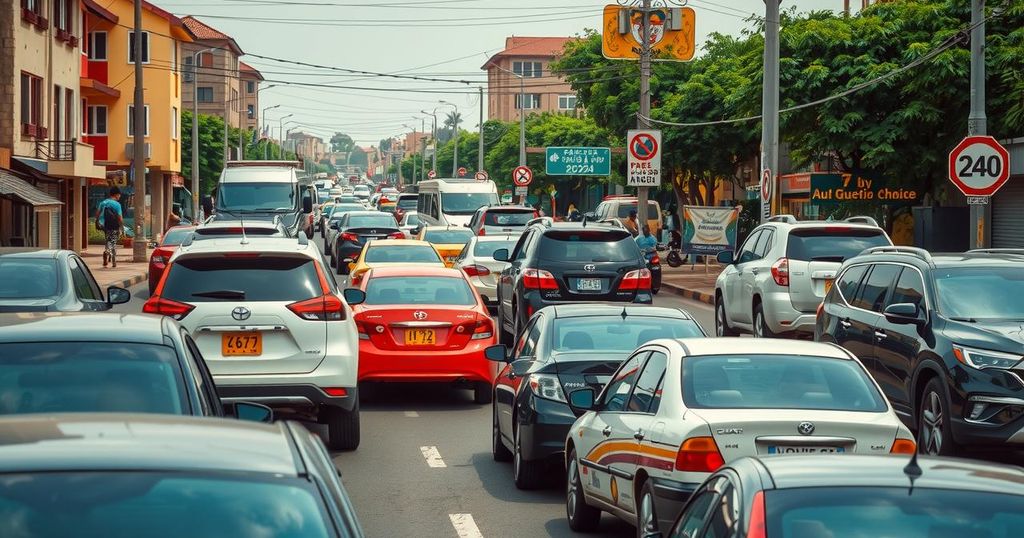A Dire Shift: The Rising Cost of Car Ownership in Nigeria

The article examines the growing unaffordability of cars for working-class Nigerians due to economic challenges. It highlights the transition from new and imported used cars to Nigerian-used cars, which, despite being less expensive, often come with quality concerns. Factors such as increased tariffs and unstable foreign exchange rates have significantly impacted vehicle prices, prompting a shift in dealership focus.
In Nigeria, the rising cost of vehicles is significantly impacting the working-class population, making new cars increasingly inaccessible. A recent facilitator’s anecdote about purchasing a Volkswagen Beetle for N3000 in the 1970s resonated with older citizens reflecting on better economic times. Today, the accessibility of brand new cars has significantly declined, along with the feasibility of affording imported used vehicles, leading many to turn to Nigerian-used cars, which come with uncertain quality and high prices.
The market has evolved, prominently featuring Nigerian-used cars that are available at various outlets, including auto markets and mechanic workshops. Dealerships like Car45, Automania, and CarsToday provide options for individuals seeking vehicles without the embarrassment of low offers. This shift serves to accommodate those facing economic hardship due to a devalued Naira and rising exchange rates, although it raises concerns regarding vehicle quality.
The high cost of Nigerian-used cars contrasts starkly with their condition, as they are often poorly maintained and have wear from adverse road conditions. A survey revealed startling prices, with a 2003 model Toyota RAV4 selling for around N4 million, far exceeding initial values despite being older models. This trend continues, with the latest Nigerian-used RAV4 listing at over N30 million, reflecting inflated market values.
Auto dealers have adapted to the changing landscape, with some opting to sell Nigerian-used cars instead of fairly-used ones due to skyrocketing prices of the latter. For instance, Nuhu Ismaila, a dealer, highlighted that many customers now prefer Nigerian-used options that are perceived as less expensive, albeit of lower quality. The conditions of these vehicles are well acknowledged by buyers, who must be cautious regarding their choices.
Several factors, including government-imposed tariffs on imported vehicles and unstable foreign exchange rates, contribute to the challenges in the vehicle market. Johnson Eremuye, an auto dealer, lamented the rising import duties and how they ultimately force prices higher for consumers, leading many to seek more affordable alternatives. This has resulted in a sizable increase in the prices of fairly-used cars, straining the budgets of average buyers.
The economic climate is further complicated by fluctuating foreign exchange rates, where the dollar value has risen sharply, dissuading some dealers from importing vehicles. This volatility, coupled with elevated costs from tariffs and other charges, has pushed many auto dealers to explore alternative business ventures beyond the auto sector. Companies specializing in Nigerian-used vehicles are consequently thriving.
Economists like Olushola Adenuba suggest that government initiatives could rejuvenate the auto industry, emphasizing support for local assembly plants. He points to Innoson Motors, which exports cars but struggles to attract local buyers. Past collaborations between governments and banks to facilitate affordable car purchases could be reintroduced to support potential buyers.
Social dynamics also exacerbate the situation; as Grace Ajayi noted, the competitive job market has diminished perks like company cars, once common in earlier decades. Pharmaceutically trained Andrew Orakwe emphasized that the ongoing economic stagnation resulting from ineffective governance is more influential than demographic changes. He argues for proactive governance that focuses on future economic growth rather than nostalgic references to better times.
The current landscape of car ownership in Nigeria highlights a worrying trend as economic factors render vehicles increasingly out of reach for working-class citizens. The shift towards Nigerian-used cars acknowledges a dire financial situation, compounded by high import duties and government tariffs. While some dealers pivot to meet market demands, the overarching challenge remains the unstable economy. Recommendations for improved auto policies could alleviate these concerns, but until then, affordability will continue to be a key issue for potential buyers in Nigeria.
Original Source: businessday.ng




